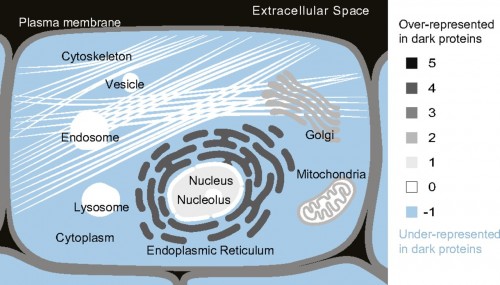
|
PIT00261 Темная материя вселенной клетки "Темный протеом" - белки, структуры которых совершенно неизвестны - является ключевым в нашем понимании биологических систем. Новое исследование показывает, что в настоящее время примерно половина протеома у эукариот и вирусов темное, необходимы более чувствительные инструменты для изучения полной белковой вселенной. Оригинал  Fig. 5 from [Perdigao2015]. Cellular locations over- and underrepresented in dark proteins. Pooling annotations for all eukaryotic proteins, we determined which subcellular compartments were enriched in dark proteins; these proteins were most strongly overrepresented in the extracellular space, followed by the endoplasmic reticulum and then the plasma membrane. Dark proteins were underrepresented among cytoplasmic proteins. Реферировать статьи пока не буду. Для интересующихся тёмной материей клеточной вселенной прилагаю точные ссылки на статьи. {Weaver2016} Janelle Weaver. Turning to the Dark Side of the Protein Universe // BioTechniques 20/1/16 {Perdigao2015} Nelson Perdigão, Julian Heinrich, Christian Stolte, Kenneth S. Sabir, Michael J. Buckley, Bruce Tabor, Beth Signal et al. Unexpected features of the dark proteome // Proceedings of the National Academy of Sciences 112 (52), 15898-15903 (2015). {Donoghue2015} Seán I. O'Donoghue, Kenneth S. Sabir, Maria Kalemanov, Christian Stolte, Benjamin Wellmann, Vivian Ho, Manfred Roos et al. Aquaria: simplifying discovery and insight from protein structures // Nature methods 12 (2), 98-99 (2015). Peter Belobrov 21 Jan 2016 06:48
© International Open Laboratory for Advanced Science and Technology — MOLPIT, 2009–2025
|